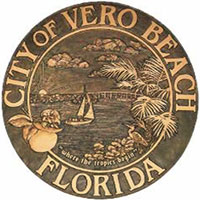 Vero Beach City Council decides to focus on riverfront development costs
Vero Beach City Council decides to focus on riverfront development costs
STORY BY LISA ZAHNER | NEWS ANALYSIS (Week of September 17, 2020)
Vero Beach officials have decided to nail down many of the costs of the city’s planned riverfront development project sooner instead of later, and to get a more concrete idea about the commercial viability of the plan.
Up till now, the council and the project steering committee have moved far down the line with planning a major waterfront development without tabulating or analyzing the costs of the various components or the overall project.
Front-loading analysis of the finances and the development market as newly proposed might drag the process out a few months, but it would likely result in a more realistic and feasible plan in the end.
Now, the council is expected to start talking about project infrastructure costs and recurring maintenance costs – and how to fund those costs – at a council meeting or workshop in October that will be devoted to financial concerns.
Councilman Rey Neville asked for a workshop. He said the process followed by the council up till now of coming up with a plan, floating a referendum and then, after it passes, performing the due diligence required to make the plan work is “totally backwards.”
“So, let’s say we can’t do what the plan calls for? Then we’re going to be stuck in the mud here.”
The city’s volunteer recreation advisory committee is also scheduled to look at potential recreational uses of the riverfront parcels when that group meets in October.
Over the next few weeks, City Manager Monte Falls and Planning Director Jason Jeffries will meet with local and regional developers to gauge their interest in building hotels, restaurants, shops, boating facilities or even multifamily dwellings on the site. Falls said he would report back to the council about those meetings in October.
“Our intent is to never take something to a referendum until we as staff and council know what the impact is going to be to the city financially,” Falls said.
Vero has $21 million in proceeds from the sale of the city’s electric utility to FPL, a portion of which the city could spend on riverfront site improvement, roads, trees, pavilions, a fishing pier, day docks and other features. But Falls said he’s intent on making the project pay for itself via developer fees and leases.
But the city’s hired planner says it’s not realistic to expect to pay zero dollars for a massive riverfront redevelopment. He said developers are not going to pay for everything.
Project architect Andres Duany has assured the city that he’s collaborated with credible and deep-pocketed developers every step of the way as he presented five different versions of the riverfront plan. He said he designed it around developers’ interests, often getting inspiration from developers on elements the market would support in the current economy – a boat barn, for example, appeared in the post-pandemic design after a developer pushed for it.
Acknowledging that the task of envisioning the so-called “Three Corners” design and the task of figuring out the cost, viability and sustainability of the vision are two separate jobs, the City Council has decided to remove itself from the project steering committee and encourage new members to join, representing a broader demographic spectrum of Vero residents and businesspeople.
Specifically, the council seemed to agree that more young people need to weigh in on the major waterfront development the community will be living with for many decades.
A resolution formally removing the five council members from the steering committee and opening five spots to others was set for approval this Tuesday.
“Having the young generation’s input on how we move forward and impact the next 50 years is awesome,” Mayor Tony Young said.
In response to statements that the council did not tackle the financial aspects of the project in a timely way and ask money questions earlier in the process, Graves defended the council saying that several members did indeed raise financial concerns early on.
But they were told not to worry about finances at that juncture – that the design meetings were “a dream session,” Graves said.




